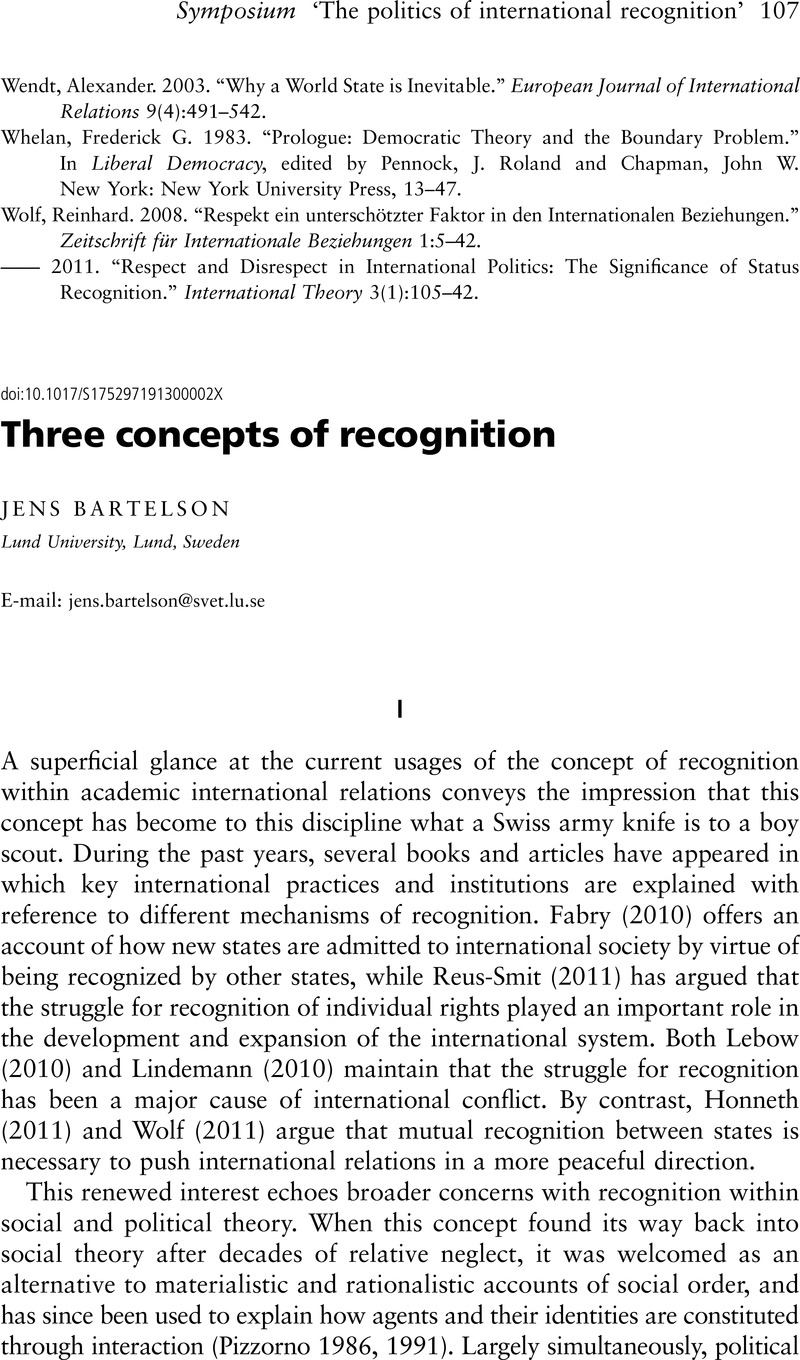Crossref Citations
This article has been cited by the following publications. This list is generated based on data provided by Crossref.
Kessler, Oliver
and
Herborth, Benjamin
2013.
Recognition and the constitution of social order.
International Theory,
Vol. 5,
Issue. 1,
p.
155.
Lindemann
2014.
Interest, passion, (non)recognition, and wars: a conceptual essay.
Global Discourse,
Vol. 4,
Issue. 4,
p.
483.
Goerzig, Carolin
and
Hofmann, Claudia
2015.
Recognition in International Relations.
p.
237.
Geis, Anna
Fehl, Caroline
Daase, Christopher
and
Kolliarakis, Georgios
2015.
Recognition in International Relations.
p.
3.
Ringmar, Erik
2015.
Recognition in International Relations.
p.
49.
Gallagher, Julia
2016.
Creating a state: A Kleinian reading of recognition in Zimbabwe’s regional relationships.
European Journal of International Relations,
Vol. 22,
Issue. 2,
p.
384.
Gustafsson, Karl
2016.
Recognising recognition through thick and thin: Insights from Sino-Japanese relations.
Cooperation and Conflict,
Vol. 51,
Issue. 3,
p.
255.
Wolf, Reinhard
2017.
Handbuch Friedensethik.
p.
903.
Sending, Ole Jacob
2017.
Recognition and liquid authority.
International Theory,
Vol. 9,
Issue. 2,
p.
311.
Tudoroiu, Theodor
2017.
Taiwan in the Caribbean: a case study in state de-recognition.
Asian Journal of Political Science,
Vol. 25,
Issue. 2,
p.
194.
Lee, Shinkyu
2017.
Freedom, the state, and war: Hegel’s challenge to world peace.
International Politics,
Vol. 54,
Issue. 2,
p.
203.
Aalberts, Tanja
2018.
Misrecognition in legal practice: the aporia of the Family of Nations.
Review of International Studies,
Vol. 44,
Issue. 5,
p.
863.
Teles Fazendeiro, Bernardo
2018.
Spirituality and anti-Western rhetoric in Uzbekistan in the early 2000s: the consequences of international misrecognition.
Post-Soviet Affairs,
Vol. 34,
Issue. 4,
p.
228.
Lindemann, Thomas
2018.
Agency (mis)recognition in international violence: the case of French jihadism.
Review of International Studies,
Vol. 44,
Issue. 5,
p.
922.
Zarakol, Ayşe
2018.
Sovereign equality as misrecognition.
Review of International Studies,
Vol. 44,
Issue. 5,
p.
848.
Grzybowski, Janis
2019.
The paradox of state identification:de factostates, recognition, and the (re-)production of the international.
International Theory,
Vol. 11,
Issue. 3,
p.
241.
Hsieh, Pasha L
2019.
The quest for recognition: Taiwan’s military and trade agreements with Singapore under the one-China policy.
International Relations of the Asia-Pacific,
Vol. 19,
Issue. 1,
p.
89.
Vitkus, Gediminas
2019.
Trilemmas of recognition in the Baltic states’ foreign policies.
Journal of Baltic Studies,
Vol. 50,
Issue. 3,
p.
307.
Phillips, Andrew
and
Reus-Smit, Christian
2019.
Culture and Order in World Politics.
Fernández-Molina, Irene
2019.
Bottom-up change in frozen conflicts: Transnational struggles and mechanisms of recognition in Western Sahara.
Review of International Studies,
Vol. 45,
Issue. 3,
p.
407.





